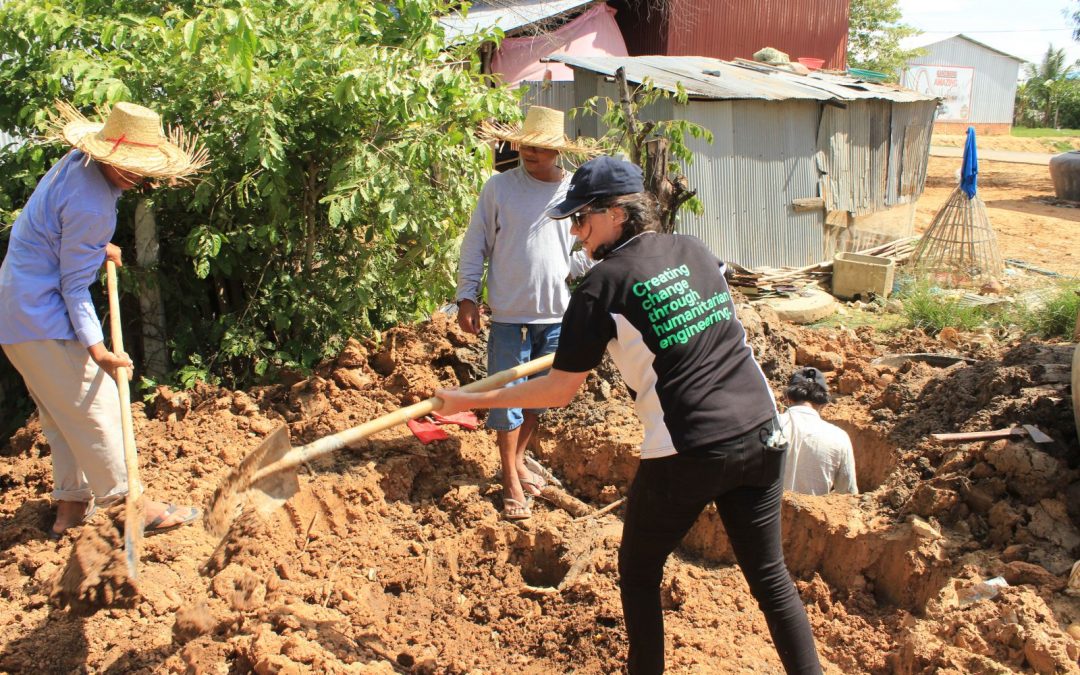Pictured: Shona gets hands-on for construction of a prototype latrine design for high groundwater areas in Cambodia
Name: Shona Fitzgerald
Position: WASH Technical and Strategy Mentor
Location: Phnom Penh, Cambodia
Tenure: July 2018-December 2019
What’s your engineering history?
I originally studied a Bachelor of Arts in French and Bachelor of Science in Chemistry. Towards the end of my degrees I thought about the career I wanted to pursue and it became obvious that engineering was a practical way to use that knowledge to transform people’s lives. I then studied a Masters of Engineering in water and wastewater engineering.
Since graduating 6 years ago I have worked for Sydney Water. My roles have been diverse, including preparing for and responding to extreme weather events, optimising energy use and recovery at wastewater treatment plants, supply chain risk management for wastewater services, water and wastewater treatment optimisation and treatment facilities planning.
Alongside my engineering work I’ve also been committed to raising the profile of water, sanitation and hygiene (WASH) issues in Australia and overseas. I have had many great opportunities in this space including participation in the inaugural UNLEASH event in 2017, sitting on the AWA WASH specialist network committee and the 2017 World Toilet Summit program committee. I have also conducted research with the United Nations University Institute for Water Environment and Health in Canada. Through these experiences I’ve worked with people from diverse backgrounds and have been able to apply my engineering skills to the complexity of WASH issues in developing countries.
Why did you take on a Field Professional role with EWB Australia in Cambodia?
My vision of a sustainable world is one that is kind to people and the planet, that is fair and is just. I love that through engineering we can work to create this world. I am passionate about WASH and was fortunate to find a placement through EWB that is a really good fit for my skills and experience. EWB is a people-centred organisation with principles that, I think, ensure sustainable development. My role with EWB has helped me to understand how to apply my skills in a humanitarian setting, to grow my understanding of international development work, to work cross culturally and with marginalised communities. It is a privilege to contribute to improving access to sanitation for people who currently have none and to know how much that can transform their lives.
What does a ‘Day In The Life’ of a Field Professional look like for you?
We have many projects on the go in the Phnom Penh office; they mostly fall into either sector engagement or technology development. When focusing on our sector engagement projects my day will often include meeting up with partners, making new connections, preparing content for knowledge sharing, attending sector events and meetings. When focusing on technology development my day involves literature reviews, ideation workshops, developing design specifications, small-scale and full-scale prototyping in the car park and field trips to speak with the community or to assess the site.
What has been the most rewarding part of the role?
I have had the privilege to be involved in everything from government consultation for policy and national planning to speaking with community members about what they do and don’t like about their toilet. It has been such a great experience to learn and contribute to international development at a national strategic scale and at a household level. The most rewarding part of the role for me has been to work with Cambodian engineers to develop technology – to see how they have grown their critical thinking skills, to see them increase in confidence to ask questions and to challenge ideas, and to see them lead decision-making for technology design.
What is something surprising about the role that you did not anticipate before commencing?
I have been surprised by how much input I would have into key decisions being made in the sector and how much weight my input and advice would have. The privilege that comes from being from a developed country with the opportunity for an excellent education means that people do not necessarily question the advice that I give. I’ve learned to be cautious with the advice I give and be better at guiding people through the logic of decision-making to help them create their own informed opinion.
What would you say to someone considering applying to become a Field Professional?
Working in-country is so valuable to grow your skills and experience in how to contribute to humanitarian engineering. The skills you will gain will make you a more rounded professional and will be relevant to any work you do in the future – whether in developed or developing countries. You will have the joy of living in a different culture and being challenged to be open-minded and adaptable. There are few roles that offer such an opportunity to learn about the social complexities and challenges of humanitarian engineering, to learn about yourself and be challenged to adapt to a different world, to experience the generosity of people who have little and to be grateful for the many things that we have in Australia.
FIELD PROFESSIONAL PLACEMENTS FOR DEPLOYMENT IN NOVEMBER 2019 ARE NOW OPEN! Find out more.


